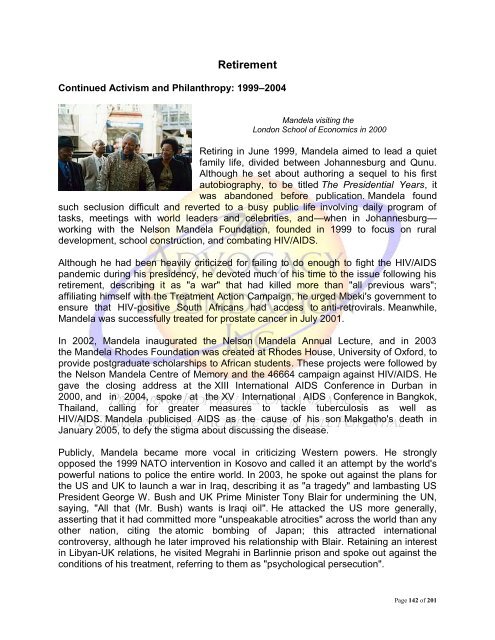You also want an ePaper? Increase the reach of your titles
YUMPU automatically turns print PDFs into web optimized ePapers that Google loves.
Retirement<br />
Continued Activism and Philanthropy: 1999–2004<br />
Mandela visiting the<br />
London School <strong>of</strong> Economics in 2000<br />
Retiring in June 1999, Mandela aimed to lead a quiet<br />
family life, divided between Johannesburg and Qunu.<br />
Although he set about authoring a sequel to his first<br />
autobiography, to be titled <strong>The</strong> Presidential Years, it<br />
was abandoned before publication. Mandela found<br />
such seclusion difficult and reverted to a busy public life involving daily program <strong>of</strong><br />
tasks, meetings with world leaders and celebrities, and—when in Johannesburg—<br />
working with the Nelson Mandela Foundation, founded in 1999 to focus on rural<br />
development, school construction, and combating HIV/AIDS.<br />
Although he had been heavily criticized for failing to do enough to fight the HIV/AIDS<br />
pandemic during his presidency, he devoted much <strong>of</strong> his time to the issue following his<br />
retirement, describing it as "a war" that had killed more than "all previous wars";<br />
affiliating himself with the Treatment Action Campaign, he urged Mbeki's government to<br />
ensure that HIV-positive South Africans had access to anti-retrovirals. Meanwhile,<br />
Mandela was successfully treated for prostate cancer in July 2001.<br />
In 2002, Mandela inaugurated the Nelson Mandela Annual Lecture, and in 2003<br />
the Mandela Rhodes Foundation was created at Rhodes House, University <strong>of</strong> Oxford, to<br />
provide postgraduate scholarships to African students. <strong>The</strong>se projects were followed by<br />
the Nelson Mandela Centre <strong>of</strong> Memory and the 46664 campaign against HIV/AIDS. He<br />
gave the closing address at the XIII International AIDS Conference in Durban in<br />
2000, and in 2004, spoke at the XV International AIDS Conference in Bangkok,<br />
Thailand, calling for greater measures to tackle tuberculosis as well as<br />
HIV/AIDS. Mandela publicised AIDS as the cause <strong>of</strong> his son Makgatho's death in<br />
January 2005, to defy the stigma about discussing the disease.<br />
Publicly, Mandela became more vocal in criticizing Western powers. He strongly<br />
opposed the 1999 NATO intervention in Kosovo and called it an attempt by the world's<br />
powerful nations to police the entire world. In 2003, he spoke out against the plans for<br />
the US and UK to launch a war in Iraq, describing it as "a tragedy" and lambasting US<br />
President George W. Bush and UK Prime Minister Tony Blair for undermining the UN,<br />
saying, "All that (Mr. Bush) wants is Iraqi oil". He attacked the US more generally,<br />
asserting that it had committed more "unspeakable atrocities" across the world than any<br />
other nation, citing the atomic bombing <strong>of</strong> Japan; this attracted international<br />
controversy, although he later improved his relationship with Blair. Retaining an interest<br />
in Libyan-UK relations, he visited Megrahi in Barlinnie prison and spoke out against the<br />
conditions <strong>of</strong> his treatment, referring to them as "psychological persecution".<br />
Page 142 <strong>of</strong> 201

















